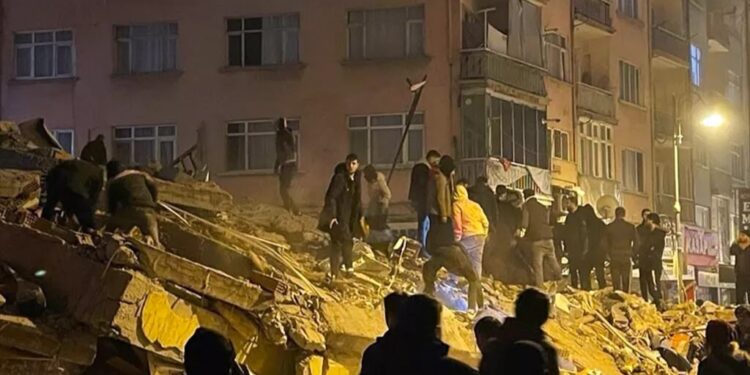Ankara/Damascus, Feb 9,2023- As rescuers are racing against time to find more survivors in Turkey and Syria amid the harsh freezing temperatures, the death toll from the devastating earthquake that struck the two countries earlier this week has increased to 15,383 as of Thursday, according to authorities.
In its latest update, Turkey’s Disaster and Emergency Management Agency (AFAD) said the country’s overall death toll currently stood at 12,391 people, with 62,914 others injured, reports Anadolu News Agency.
More than 6,000 buildings collapsed in the aftermath of Monday’s massive 7.8-magnitude quake, while more than 13 million people have been impacted so far in the 10 Turkish regions of Kahramanmaras, Gaziantep, Hatay, Osmaniye, Adiyaman, Malatya, Sanliurfa, Adana, Diyarbakir and Kilis.
In Syria, there were at least 2,992 deaths, of which 1,730 were reported in rebel-held areas in the northwest, according to the “White Helmets” civil defence group, and 1,262 fatalities were registered in government-controlled parts of the country, says the state media, CNN reported.
Since the disaster struck on Monday, 70 countries and 14 international organisations have offered Turkey relief, according to President Recep Tayyip Erdogan.
However, the international aid situation in Syria is less clear as the Country has been heavily sanctioned due to the ongoing civil war.
So far, the UAE, Iraq, Iran, Libya, Egypt, Algeria and India have sent relief directly to regime-controlled airports, reports CNN.
Others such as the Taliban-ruled Afghanistan, Saudi Arabia, Qatar, Oman, China, Canada and the Vatican have pledged aid, though it is unclear if that relief will be sent directly to the regime.
The EU has confirmed it will send 3.5 million euroes in aid to Syria following a government request for assistance, but said the aid must be delivered to both government- and rebel-controlled areas.
Earlier on Wednesday, the Syrian government said it has set up more than a hundred shelters equipped with aid supplies for those affected by the earthquake across government-controlled areas, including in the cities of Aleppo, Hama, Homs, Tartus and Latakia, a coastal city which has the highest number of earthquake deaths counted in Syria so far, and over 100 collapsed buildings.
Meanwhile, Turkish President Erdogan, who visited the quake-hit areas on Wednesday, has defended his government’s response, saying it was impossible to prepare for the scale of the disaster after critics claimed the emergency services’ response was too slow, the BBC reported.
Addressing reporters in Hatay, he accepted the government had encountered some problems, but said the situation was now “under control”.
Rescuers and volunteers are working round the clock to locate the trapped under rubble as the survival rate without food or water drops drastically after the 72nd hour, which is rapidly approaching, reports Xinhua news agency.
Experts have warned that the 72-hour window for rescuing those trapped by the earthquakes may be much smaller than anticipated, given the low temperatures that have swept through the earthquake-hit regions will increase the risk of hypothermia.
The devastating 7.8 tremor struck Turkey’s southern province of Kahramanmaras at 4.17 a.m. on Monday morning, which was followed by a 6.4-magnitude temblor a few minutes later in Gaziantep province.
The epicentre of the 7.8-magnitude quake was 23 km east of Nurdagi in Gaziantep, at a depth of 24.1 km.
At around 1.30 p.m, a third 7.5-magnitude tremor hit Kahramanmaras, which officials said was “not an aftershock”. (Agency)








